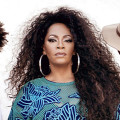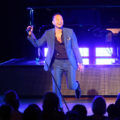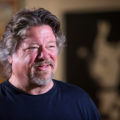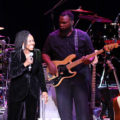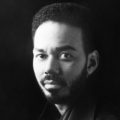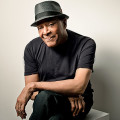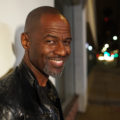“The Healing” pulses over pop, hip-hop, R&B, fashion, business groundbreaker Jody Watley
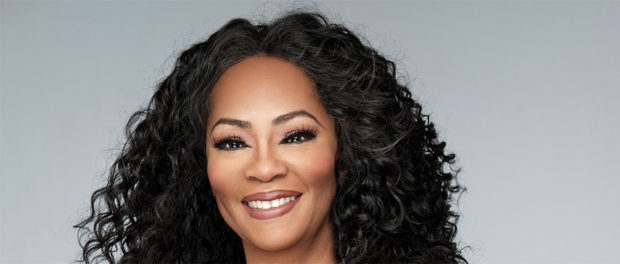 Photos provided by Jody Watley and Avitone
Photos provided by Jody Watley and Avitone
Her body of work as a Grammy-winning singer/songwriter with dozens of chart-topping pop, hip-hop, R&B and dance singles, alongside being the first artist to ever combine vocals and rap in the same track, more than earned Jody Watley a Billboard Lifetime Achievement Award.
But the foresight to start her own record label 25 years ago, intermingle music with high fashion even earlier and explore a variety of entrepreneurial endeavors should also put this multi-hyphenate in a similarly groundbreaking category as Madonna or Janet Jackson, while leaving the likes of Beyoncé or Rihanna eternally indebted.
And that’s not even taking into account getting started as a dancer on TV’s ginormous “Soul Train” or spring boarding into Shalamar, soulfully harmonizing on everything from the disco delight “The Second Time Around” through the ageless ballad “This Is For The Lover In You.”
Shortly after dropping a hot new hit, “The Healing (The APX Remix),” Ms. Watley rang Chicago Concert Reviews for extensive commentary on practically “Everything,” her formative years here in town (where she’ll return on Saturday, August 7 at Northalsted Market Days), plus candid assessments of genre, gender, race and rising above numerous roadblocks as she re-wrote entertainment history.
You were born right here in Chicago. How much time did you spend growing up or visiting over the years?
 Jody Watley: I was definitely born in Chicago and we moved away when I was very young, probably 6 or 7. At one point, my dad and my grandfather had a church there at 3140 South Indiana. It was called Watley Temple and then Jerusalem Temple. I believe my grandfather’s church is a landmark in the city because it survived the Chicago Fire and they also used to have [major city] meetings. My dad was on the radio doing gospel music on WDON and WDEE. Both my father and grandfather were very prominent in the Black church world there. We moved around a lot, but ended up settling here in California. At one point, I entered myself into the Miss Black Teen Illinois pageant when we had gone back there and lived there again briefly when I was a teenager. I was Miss South Shore Drive [laughs]. We didn’t have a lot of money, so I made my outfit. I couldn’t afford the whole picture package, but I have like two pictures. I didn’t win, but I remember I was voted the girl with the best smile and I guess that’s still true [laughs].
Jody Watley: I was definitely born in Chicago and we moved away when I was very young, probably 6 or 7. At one point, my dad and my grandfather had a church there at 3140 South Indiana. It was called Watley Temple and then Jerusalem Temple. I believe my grandfather’s church is a landmark in the city because it survived the Chicago Fire and they also used to have [major city] meetings. My dad was on the radio doing gospel music on WDON and WDEE. Both my father and grandfather were very prominent in the Black church world there. We moved around a lot, but ended up settling here in California. At one point, I entered myself into the Miss Black Teen Illinois pageant when we had gone back there and lived there again briefly when I was a teenager. I was Miss South Shore Drive [laughs]. We didn’t have a lot of money, so I made my outfit. I couldn’t afford the whole picture package, but I have like two pictures. I didn’t win, but I remember I was voted the girl with the best smile and I guess that’s still true [laughs].
Do you have any standout shows you saw or performed in town?
Watley: I remember seeing Josephine Baker as a little girl at the Regal Theater. My parents took my brother and I. She was older then, but I just remember this beautiful Black woman with a beautiful head dress. And then personally, when I went on my first solo tour on my second album [“Larger Than Life”], it was the Riviera Theatre. That was a great show. It was bittersweet for me though because my dad was the one that always said his daughter was “Princess Jody.” I was gonna be a star, a “super superstar” he would say. He didn’t get to live to see me achieve my solo success, but I always know that I’m making him proud. He claimed it for me as a baby. He would say it on the radio and always tell the people his “Princess Jody” was going to be a star, so it started there in Chicago with him saying that on the radio.
Well, you’re back on the radio with “The Healing,” which came out during this unusual year with the whole world at home. How have you been readjusting and what brought about the track?
Watley: Throughout my career, I’ve always taken time off. I’ve always tried to have balance in my life where I can be a homebody, and cook food, and [be there] when my kids were growing up. The difference is that this wasn’t by choice. We were all put into this pause and work stoppage with this pandemic. Though I’m a performer, I’m more of an introvert actually and I like being on my own. As time went on, I really just have tried to tap into inspiring people that follow me, my fans, and not give up in these challenging times. I wasn’t going to put “The Healing” out. I had been working on it before the pandemic ironically, and then I thought “people need to hear this,” to be inspired and to bring some hope to a time where there’s a lot of despair…And I say it in “The Healing.” Embrace your light, “embrace your wattage” and “embrace the possibilities of the future.”
 From that, I’ve had an online boutique for about 20 years, so I launched the beginning of my wellness line now that I really have time to focus on that. [I developed] “Sanctuary” candle and interior room fragrance to create some peace. I’m all about peace and wellness. I always have been. Really I’ve just been trying to keep busy and not gain weight [laughs]. I’m trying my best to avoid the quarantine 15 [laughs]. From time to time, I do meatless Mondays because I’ve been trying to do plant-based periodically. I’ve shared some recipes and I’m gonna do a little bit more of that too because I know a lot of people are struggling staying healthy, not only mentally, but physically. I’m just trying to use my platform to inspire people in a positive way because there’s enough where you can rant and rave about different things, but that’s not really my thing to do.
From that, I’ve had an online boutique for about 20 years, so I launched the beginning of my wellness line now that I really have time to focus on that. [I developed] “Sanctuary” candle and interior room fragrance to create some peace. I’m all about peace and wellness. I always have been. Really I’ve just been trying to keep busy and not gain weight [laughs]. I’m trying my best to avoid the quarantine 15 [laughs]. From time to time, I do meatless Mondays because I’ve been trying to do plant-based periodically. I’ve shared some recipes and I’m gonna do a little bit more of that too because I know a lot of people are struggling staying healthy, not only mentally, but physically. I’m just trying to use my platform to inspire people in a positive way because there’s enough where you can rant and rave about different things, but that’s not really my thing to do.
Will this single be part of a larger project or are you going to concentrate on individual releases?
Watley: My last project was the “Winter Nights” EP, which came out in February, and at the time, my concept was I wanted to do a series of seasonal EPs. [I was] working on “Spring,” which is all about cleansing, and healing, and beginning fresh. “The Healing” was actually the last song that was going to be a part of the “Spring” EP, but I had some things I needed to still refine, so I couldn’t finish it because the recording studio that I use has been closed, though I think they may be reopening now. “Summer” was gonna be dance [themed] and I had started writing with The APX, who did the new remix for “The Healing.” I love their work and a lot of people say it kinda feels like modern ‘80s cause it’s that funk/synth feel, but in a contemporary way. So we’ve been working on some original, new music that we were writing together and then “The Healing.”
I was like “okay, we’re not going to be able to get in the studio, so would you guys do the remix? I think it will be great to dance to and work out to it.” About two years ago, The APX, they’re a husband and wife, did a remix of my “Looking For A New Love.” They tagged me on Instagram, I loved it and I’ve been a fan since. That’s the positive thing of social media. At some point, we’ll be able to do the “Summer” EP. It’ll just be totally me and The APX cause it’s dance and up-tempo. Until that time comes, I’ll probably do another single.
Since I started my own label in ‘95, Avitone, which was definitely influenced by Prince when he left Warner Brothers and started NPG Records, I’m also toying with the idea to do a compilation. Mainstream may not know them, but a lot of my mixes from Avitone have done so well, I was thinking about remastering them and putting those out as “Volume 1: Hit Them Beats…” One [other] thing before my memoirs [that I’m currently writing], I’m working on a coffee table book…I had the vision to own all my photography, so my original art director, Lynn Robb, and I have been working on a coffee table book [based] solely on photography and focused only on my solo debut.
 Your string of hits was virtually unstoppable throughout those early albums in particular. Were you ever able to enjoy yourself, or was it all moving so fast with expectations to keep it up?
Your string of hits was virtually unstoppable throughout those early albums in particular. Were you ever able to enjoy yourself, or was it all moving so fast with expectations to keep it up?
Watley: When I did a total pivot musically with the more introspective “Affairs Of The Heart” in ‘91, no one at my label at the time, MCA, who were there on my first two albums were there [anymore], so the whole climate changed on the corporate side. Fans, people don’t know that side, but the new regime, wanted to bring in their artists. Like any job, they want new people. There were times, I wouldn’t say it was pressure, but “you should work with” whoever was the hot producer of the moment. “We really want you to work with Babyface” or “we really want you to work with Teddy Riley.” I never wanted to feel like I was jumping on the bandwagon of the hot producer of the moment. [Although] I think, in retrospect, I wish I had worked with Teddy Riley.
So at the time, I was being true to myself. I never felt like I needed to do “Looking For A New Love” and “Don’t You Want Me” over and over. I’ve always been really kind of fearless. I’m just gonna do what I want. If people like it, they like it, and if they don’t, they don’t. I never followed the pop music formula, though I’ve landed in the Billboard Top Hot 100 artists of all time simply based on my first two or three albums, which is awesome because some people never achieve that at all.
The diversity has to be true to the artist. I do know that probably if I had played the game of it more, in terms of pop radio, I would’ve had even more pop hits, but I didn’t want to play the game. I’m so proud of all my music, the really popular, super commercial, as well as the more underground, to “The Healing,” because there’s always an authenticity to everything that I do.
“Friends” was the first song that ever combined both singing and rapping outside of an introduction. Did you realize you were blazing such a significant trail or simply going with what felt right?
Watley: I always say it’s a quietly groundbreaking song because Rakim and I never get credit for the trail that everybody has been on that ever since. It is the first rap/sung collaboration and pop/R&B/dance/hip-hop to crossover top 10 on multiple charts. That hadn’t been done before and it did become the formula that everybody has in their playbook to this day. When I was writing “Friends,” which is a song about betrayal and backstabbing, I was just hearing Rakim’s voice with me on it, so when I pitched it to MCA, I pitched it actually as a duet. That’s the only way I could explain it at the time because it wasn’t happening. Michael McDonald and Patti LaBelle had out “Own My Own,” which was a huge record, and I said “when Michael McDonald comes in, Rakim will be coming in on my song. He’ll rap the verse instead of singing the verse.”
 And they were like “oh, alright, we still don’t get Rakim. We don’t think that will work” because Rakim wasn’t mainstream. He’s like a real deal hip-hop legend, so then they said “well, what about ‘The Fresh Prince’ Will Smith?” He was pop, and that would be like the label formula move. “I like Will Smith, but no, it won’t be authentic to the song. He’ll make it feel like a happy song. I want the darkness, that bite, that tone, that only Rakim can bring.” Once I convinced MCA, then I didn’t even have to sell it to Rakim. “Whatever you want Jody” cause he loved me. It’s a groundbreaking song, and even the video is very quietly innovative with transgendered drag queens, b-boys and voguers. I wanted everybody to be in this mix of “we can all live together and have a great time.” It’s like a utopia of everybody having fun in the club and people that you don’t think would be cool with each other. I’m very proud of the song and the video. The collaboration was so new a lot of stations at the time wouldn’t play the rap version with Rakim. They would edit it out cause that’s when radio said “we don’t play hip-hop. No rap music” [laughs]. Now it’s all rap music! [laughs].
And they were like “oh, alright, we still don’t get Rakim. We don’t think that will work” because Rakim wasn’t mainstream. He’s like a real deal hip-hop legend, so then they said “well, what about ‘The Fresh Prince’ Will Smith?” He was pop, and that would be like the label formula move. “I like Will Smith, but no, it won’t be authentic to the song. He’ll make it feel like a happy song. I want the darkness, that bite, that tone, that only Rakim can bring.” Once I convinced MCA, then I didn’t even have to sell it to Rakim. “Whatever you want Jody” cause he loved me. It’s a groundbreaking song, and even the video is very quietly innovative with transgendered drag queens, b-boys and voguers. I wanted everybody to be in this mix of “we can all live together and have a great time.” It’s like a utopia of everybody having fun in the club and people that you don’t think would be cool with each other. I’m very proud of the song and the video. The collaboration was so new a lot of stations at the time wouldn’t play the rap version with Rakim. They would edit it out cause that’s when radio said “we don’t play hip-hop. No rap music” [laughs]. Now it’s all rap music! [laughs].
How do you feel genre and gender issues in music have evolved compared to when you were fighting those battles?
Watley: I would say in some ways it’s easier now to be different. I look at Rihanna. She’s been able to take her fashion, and style, and brand it, and be a big business woman. Long hair or short hair, “oh, we love it! Beauty.” As opposed to “well, what is she doing? Why is her hair short now? Why is she doing this?” Fans love it. Social media eats it up. At that time, for me as a Black woman especially, “well, she’s too edgy for a lot of radio.” I dealt with a lot of politics with Black radio and pop radio back when there was an urban department at the labels. If you were signed in the Black department, you’re a Black artist. It sounds like the ‘50s, but it was separate. I was one of the first artists at MCA to bridge that gap, so it was new for everybody. At the time, and I talk about it in the book I’m working on, I was offered Pepsi commercials, Chrysler car commercials and all sorts of things, but people were turning it down for me. They said “you’ll get too much backlash because you’re a Black girl. You’ll be called a sell out,” so I did not get the benefit of opportunities that should’ve been like “well, hell yeah!”
It’s like music and fashion. I was one of the first to [combine them]. I was just authentic. I wasn’t trying to be anything, but it’s like “why can’t I be high fashion? Why can’t I be in Vogue or Harper’s Bazaar?” For my first layout in Harper’s Bazaar, I flew myself because the label didn’t see what being in a fashion magazine has to do with selling records. You go on any newsstand for the last ten years and all they do is put artists on the covers of fashion magazines: Black, White, Latino, whatever! I helped open that door. I don’t get the acknowledgement for it, but I’m one of the ones to open the door for young artists today. The things that they take for granted didn’t exist even for female artists. You couldn’t be pregnant in the public without the label saying “you’re gonna mess up your career.” Now you get a featured layout with your pregnancy photo, and you can do your pregnancy reveal, and people love it. But I came from the time when in my video for “It All Begins With You,” I was only filmed from the neck up because the label was not trying to have me be seen pregnant in the video.
 I just think about them reposting a PSA I did in ‘92 for Rock The Vote. It was even backlash for me. “You shouldn’t do that” or being a part of “Red Hot + Blue,” which was the first projects for AIDS/HIV, bringing that knowledge to the public in the documentary and the music compilation celebrating the music of Cole Porter. I had to fight to be on that…My label was like “you can’t do it. People will think you have AIDS!” “I’m doing it anyway. Just give me the release to do it.” Now artists are being activists, and I’m not an activist, but I’ve always been outspoken. It’s acceptable now as opposed to then when “you can’t be a part of a project that is creating HIV awareness because people will think you have it.” It’s like the dumbest statement! It’s like if I say I’m supporting cancer awareness or fighting hunger, it doesn’t mean [I have cancer or hunger]. Come on, seriously! That’s how it’s different in a positive way. The artists can be more free, and even though they might experience some public backlash, or trolls or what not, the climate of it is a lot more acceptable.
I just think about them reposting a PSA I did in ‘92 for Rock The Vote. It was even backlash for me. “You shouldn’t do that” or being a part of “Red Hot + Blue,” which was the first projects for AIDS/HIV, bringing that knowledge to the public in the documentary and the music compilation celebrating the music of Cole Porter. I had to fight to be on that…My label was like “you can’t do it. People will think you have AIDS!” “I’m doing it anyway. Just give me the release to do it.” Now artists are being activists, and I’m not an activist, but I’ve always been outspoken. It’s acceptable now as opposed to then when “you can’t be a part of a project that is creating HIV awareness because people will think you have it.” It’s like the dumbest statement! It’s like if I say I’m supporting cancer awareness or fighting hunger, it doesn’t mean [I have cancer or hunger]. Come on, seriously! That’s how it’s different in a positive way. The artists can be more free, and even though they might experience some public backlash, or trolls or what not, the climate of it is a lot more acceptable.
Going back to simpler times, we haven’t talked about you being a dancer. What comes to mind when Soul Train comes up in conversation?
Watley: I dread it [laughs]. I always keep young dancers in my show that are twirling and carrying on. I love the energy, I love the new innovation and I always relate to dancers because I did start as a dancer. Don Cornelius creating a show like “Soul Train,” an iconic, global show, it’s a blessing. I’m somewhat joking, but I’m more proud of being a songwriter and an artist with longevity because sometimes people will be like “well, she’s a dancer.” It’s like “I haven’t been a dancer since I was 14, 15, 16 years old,” but when I got on the show, I always hoped that it would lead to something bigger. The clips are still fun. I’m proud to be an alumna of the show, absolutely, but it’s so long ago and I’ve been an artist for so long. It’s a moment from my youth, it was fun and people still love those clips of “Soul Train,” so it’s all good.
How do you view all you were able to accomplish when you took your next step to Shalamar?
Watley: I was in the group for six years. I’ve accomplished so much and continue to accomplish so much as a solo artist, it’s like Shalamar is such a very small part of my journey. People love the songs and that’s great. Obviously I’ve had a conceptual show where I had some of the songs in there for a while, but my true emergence is Jody Watley as a songwriter. Though I wrote a few songs in the group, it was really like a “paying your dues” time. It wasn’t glamorous. It was very hard. In writing my book, it’s just like one chapter and then there’s like 50 other chapters going on, but people love the songs. I always say, and it’s true, that I’m proud to be a part of two bodies of work that people love. Not many [artists] get to say that. They’re very few people that leave groups that become multi-million-selling, Grammy-winning solo artists and break so many new grounds that I’ve been able to achieve as a solo artist.
Nobody expected me to succeed cause I wasn’t the lead singer. In establishing Jody Watley, I’m very meticulous and very passionate about it. I’m here because I’ve had opportunities, but I have talent, tenacity and perseverance as Jody Watley, which is what really keeps driving me over 35 years as a solo artist. That’s the fuel cause I just get to be myself and not made up of people saying “well, sing this song. This is what you do.” I did conceptualize a few of the album covers and had a little bit of creative input, but Jody Watley is what sustains me. It is my bread and butter [laughs] and chilled champagne [laughs].
 As a bonus holiday question, what was it like being involved in Band Aid’s “Do They Know It’s Christmas?”
As a bonus holiday question, what was it like being involved in Band Aid’s “Do They Know It’s Christmas?”
Watley: It was amazing and what an honor. I’m just so grateful to have so many great experiences and that is definitely one. That’s the first thing I did after I left Shalamar. I was living in London and I was in meetings with Phonogram to do a solo project, which ended up going nowhere, but from that, the Band Aid session came about. None of us knew how big it would be in that it would end up being history. All we knew was that the Ethiopian famine was heavy in the news then and people wanted to know what they could do. Sir Bob Geldof had this idea to do this single, so he arranged it that day. That’s why everybody looks a little ragamuffin. “Let’s just go in and do this song.” I could tell you I was just in awe because it’s like Sting, Duran Duran, Boy George, Bono, U2, Bananarama. It was the crème of the crop. All the biggest stars of British music, just one after the other. That’s how George Michael and I ended up doing the duet, [“Learn To Say No,”] for my album. Looking back on it, it’s just surreal. Every year they show the video and play the song.
Someone just tagged me and I posted it on my Facebook. Bananarama was on BBC talking about it, and they were saying how it was just kind of crazy that there were only three women in it, and it’s just a sea of guys. At the time, Kim Wilde and Sade were out. We don’t know if they had been offered to come, but also, I’m the only Black woman there too…I’m very shy, and [not that] talkative, and it was funny because all these cute boys were crushing on me. They were coming up to me, and I was just kind of at a loss for words, like “hi” and playing it cool, but it was great…It was just phenomenal to be a part of that and I loved it. It doesn’t really get better than that!
Jody Watley performs at Northalsted Market Days on Aug. 7. For additional details, visit JodyWatley.net and Northalsted.com/MarketDays/.

